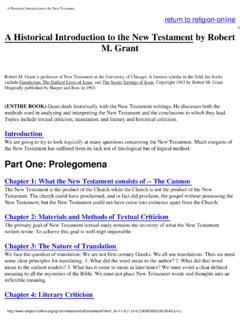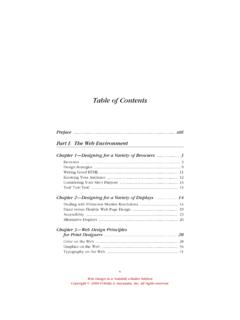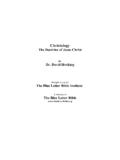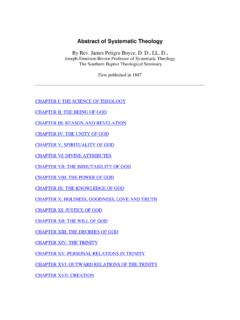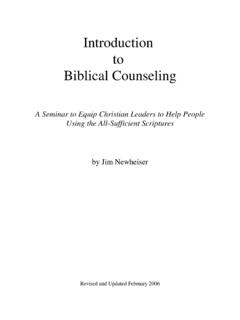Transcription of Salvation in the Old Testament - Online Christian …
1 John S. Feinberg, Salvation in the Old Testament Tradition and Testament . Essays in Honor of Charles LeeFeinberg. Chicago: Moody Press, 1981. Hbk. ISBN: 0802425445. [ ]3 Salvation in the Old TestamentJohn S. FeinbergJOHN S. FEINBERG ( , , University of Chicago;M. Div., Talbot Theological Seminary: , Trinity EvangelicalDivinity School) is professor of systematic theology at LibertyBaptist Seminary, Lynchburg, does the Bible teach about Salvation ? Ask this question of most people, and they willrespond with their understanding of the New Testament s teaching on Salvation . One can searchfor hours and find little written about Salvation in the Old Testament . Biblical theologians tend todiscuss it more often than systematic theologians, but neither group devotes much attention to , if one were to peruse course outlines for most classes taught in seminaries or Biblecolleges in soteriology, he would find that the question of Salvation in the Old Testament receiveslittle or no treatment it is difficult to find discussions on the Old Testament s approach to the broad theme ofsalvation, it is even harder to find treatments of the Old Testament s perspective on the specificmatter of Salvation of the individual.
2 Although there are studies of such topics as corporateelection and national Salvation (especially when the topic is physical deliverance from some kindof bondage or evil),1 it seems that theologians and exegetes have tended to shy away from aconsideration of the Old Testament teaching about how an individual was to acquire spiritualsalvation. Why this should be so is not entirely clear. Perhaps it has stemmed at least partiallyfrom a feeling, on the one hand, that the Old Testament really says nothing different than theNew on the matter of personal Salvation .[ ]Or perhaps it stems from a fear that what the Old Testament teaches about Salvation is soradically different from the teaching of the New Testament that close attention to it would onlyserve to confuse us about God s manner of dealing with personal Salvation , and might even leadus to the theologically damaging conclusion that God has been inconsistent in regard to thematter of view of these considerations, I suggest that the study of Salvation in the Old Testament is moreurgently needed, and it is my intention to consider several issues related to the Old Testament steaching about the spiritual Salvation of the individual.
3 Obviously, it would be impossible in astudy of this length to cover every relevant aspect of Old Testament teaching, but I should like toaddress three main topics. First, I want to consider the method of Salvation . Does Scripture teachmore than one way of Salvation an Old Testament and a New Testament way? This matter is ofJohn S. Feinberg, Salvation in the Old Testament Tradition and Testament . Essays in Honor of Charles LeeFeinberg. Chicago: Moody Press, 1981. Hbk. ISBN: 0802425445. not only from the standpoint of coming to a proper understanding of scriptural teaching,but also because many have thought that dispensationalism involves or even necessitates acommitment to multiple ways of Salvation . What I shall argue in regard to the first issue is thatneither the approach of Scripture nor that of dispensationalism necessitates holding to multiplemethods of Salvation . Second, I want to discuss the implementation of Salvation .
4 To say thatScripture teaches only one way of Salvation is not to specify what it is or how it has beenimplemented at various times in history, especially during Old Testament times. Third, I want toconsider the relationship of Old Testament sacrifices to Christ s sacrifice and to discuss as wellthe exact soteriological function of sacrifices in the Old Testament system. Involved in thediscussion of the function of the sacrifices will be a treatment of their efficacy, especially in viewof the statement in Hebrews 10:4 that not all the blood of bulls and goats could take away sin. THE METHOD OF SALVATIONHow many ways of Salvation does Scripture teach? Reading various theologians, one mightinitially assume that the question is a waste of time, for all seem to assert that Scripture teachesonly one way of Salvation operative in all economies and at all times. For example, afterpresenting opposing viewpoints, Hodge emphatically argues:[ ]In opposition to these different views the common doctrine of the Church has ever been, that theplan of Salvation has been the same from the beginning.
5 There is the same promise of deliverancefrom the evils of the apostasy, the same Reedeemer, the same condition required for participationin the blessings of redemption, and the same complete Salvation for all who embrace the offers ofdivine , Payne argues that in spite of some difference, the doctrine of regeneration is taught inthe Old Testament as well as in the New. He explains:This definition of regeneration as being in Christ by no means, however, eliminates thedoctrine of the new birth from the Old Testament . There is but one, unified Testament , God ssole plan of Salvation , through which Christ offers a redemption that is equally effective forthe saints of both dispensations. Christ states that Abraham, in the patriarchal period, rejoicedto see His day, And he saw it, and was glad (John 8:56). Jesus was the Mediator of the oldertestament, as well as the newer (Heb. 9:15); and, since it is true that no man cometh unto theFather but by Him (John 14:6) and yet, since the saints of the older dispensation did indeedcome to the father (Ps.)
6 73:24), they must have been made perfect in Him (Heb. 11:40).3 Examples such as the preceding could be proliferated seemingly ad in finitum, but of course, ifthat is the case, is it even worthwhile to ask the question about how many ways Scriptureteaches? The question is important because there are many who think there is much disagreement In the process of preparing this study I have been greatly aided by discussions and interaction with Duane Dunham,Paul Feinberg, Robert Hughes, and Bruce Ware. I want to express my appreciation for their S. Feinberg, Salvation in the Old Testament Tradition and Testament . Essays in Honor of Charles LeeFeinberg. Chicago: Moody Press, 1981. Hbk. ISBN: 0802425445. the issue. Many non-dispensational writers (such as Hodge and Payne, quoted above), whohold to one method of Salvation , have accused dispensationalists of teaching multiple ways ofsalvation. They assume that since the dispensationalist consistently differentiates between God sprogram for Israel and His program for the church, since he emphasizes that God institutesdifferent economies with men at various times, and especially since the dispensationalist claimsthere are significant differences between the dispensation called law and the dispensation calledgrace (even the labels of the dispensations supposedly tip us off to different methods ofsalvation), the dispensationalist must hold that Scripture teaches multiple ways of Salvation .
7 Forexample, Daniel Fuller, after quoting the old Scofield Reference Bible, concludes:Hence Dispensationalism, as expounded by one of its foremost systematizers, teaches twoways of Salvation : that during the era of law,[ ]obedience to it was a condition of Salvation , whereas during the age of grace, Salvation comessimply through faith in does not put the matter quite so bluntly as Fuller, but as he reasserts the unity of God sredemptive plan throughout Scripture, the message in regard to dispensationalism is the same asFuller s. Payne writes:More serious, however, than its misapplication of particular prophecies, is what amounts todispensationalism s repudiation of the whole, unified redemptive plan of God in humanhistory. Indeed, the normative truthfulness of the older Testament of the past is dependentupon its essential identity with, and fulfillment in, the newer Testament of the present and thefuture.
8 Correspondingly, the blessing for the modern Church, as this is contained in the OldTestament, can be appropriated by today s saints only when they accept their own equation, asthe Israel of God, with that ancient Israel to whom God extended His testamental promises. Itthus becomes apparent that a comprehensive understanding of God s gracious purpose-whichhas been one and the same from Genesis 3:15, right on through to the closing chapters ofRevelation-lies contingent upon the Christian s recognition of one cross, one Testament , onefaith, and one Church throughout all citations level devastating attacks at dispensationalism, especially if dispensationalists infact hold multiple methods of Salvation , whereas Scripture teaches one method. As a matter offact, dispensationalists (older and contemporary) do hold that Scripture teaches only one way ofsalvation. In all honesty, however, it must be admitted that statements made by certaindispensationalists in the past appeared to teach multiple ways of Salvation .
9 That such carelessstatements did not reflect the full thinking of those theologians (as can be seen from otherstatements they made) seems to have escaped many critics of dispensationalism. One suchunguarded statement, however, appeared in the old Scofield Reference Bible:As a dispensation, grace begins with the death and resurrection of Christ (Rom. 3:24-26; 4:24,25). The point of testing is no longer legal obedience as the condition of Salvation , butacceptance or rejection of Christ, with good works as a fruit of S. Feinberg, Salvation in the Old Testament Tradition and Testament . Essays in Honor of Charles LeeFeinberg. Chicago: Moody Press, 1981. Hbk. ISBN: 0802425445. [ ]Fuller (see above) cites this as evidence that Scofield taught multiple ways of Salvation , one bylaw and one by grace. Certainly, such a statement would appear to be problematic. What seems tobe equally problematic, however, is that Fuller never quotes the Scofield Reference Bible when itstates that law neither justifies a sinner nor sanctifies a believer.
10 7 Fuller went on to claim thatalthough some dispensationalists hold to the view that Scripture teaches only one way ofsalvation, he claimed that it was a new trend in dispensationalism and not really consistent withits basic line of Fuller was at least willing to admit that dispensationalists makestatements contrary to the multiple methods position. But he still thought that this was merely anew development in dispensationalism. Many critics of dispensationalism have not even botheredto mention such statements as those cited by Fuller. Charles Ryrie in Dispensationalism Todayhas presented ample evidence that older as well as more recent dispensationalists in fact hold toonly one way of Salvation being taught in It is truly unfortunate that in spite of all theink that has been spilled on the subject, the commonly held caricature of dispensationalism(perhaps even held by some uninformed who claim to be dispensationalists themselves) is that itis committed to and even necessitates the notion that Scripture teaches multiple ways ofsalvation.
